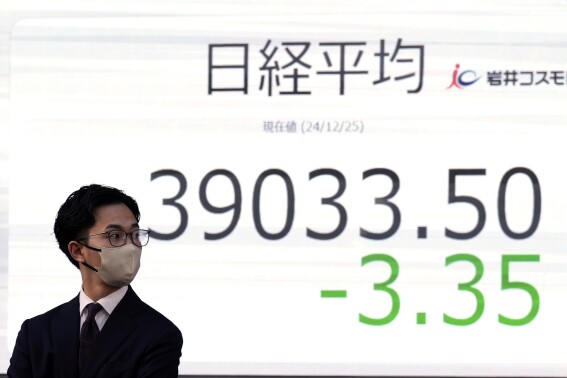BANGKOK (AP) — Shares slipped in Tokyo and Shanghai on Wednesday, two of only a handful of world markets open on Christmas day.
Oil prices rose.
Japan’s Nikkei 225 index edged 0.1% lower to 38,997.02, while the Shanghai Composite index lost 0.2% to 3,387.41.
Thursday will bring a weekly update on U.S. unemployment benefits.
Also early Wednesday, U.S. benchmark crude oil was up 93 cents at $70.17 per barrel. Brent crude, the international standard, picked up 6 cents to $73.23 per barrel.
The dollar rose to 157.37 Japanese yen from 157.11 yen. The euro rose to $1.0431 from $1.0397.
On Tuesday, stocks closed higher on Wall Street in a shortened holiday session. Gains in Big Tech stocks helped the S&P 500 to a 1.1% gain, while the Dow Jones Industrial Average rose 0.9%. The Nasdaq composite climbed 1.3%.
Advancers outnumbered decliners by more than 3-to-1 on the New York Stock Exchange.
Broadcom rose 3.2%, Apple gained 1.1% and Amazon closed 1.8% higher. Super Micro Computer climbed 6%.
Tesla jumped 7.4% for the biggest gains among S&P 500 stocks.
American Airlines shook off an early loss and ended with a 0.6% gain after the airline briefly grounded flights nationwide due to a technical issue.
Elsewhere in the market, U.S. Steel rose 1.9% a day after an influential government panel failed to reach consensus on the possible national security risks of the nearly $15 billion proposed sale to Nippon Steel of Japan.
NeueHealth surged 74.9% after the health care company agreed to be taken private in a deal valued at roughly $1.3 billion.
Tuesday’s U.S. market “Santa rally” comes as the stock market enters what’s historically been a very cheerful season. The last five trading days of each year, plus the first two in the new year, have brought an average gain of 1.3% since 1950.
So far this month, the U.S. stock market has lost some of its gains since President-elect Donald Trump’s win on Election Day, which raised hopes for faster economic growth and more lax regulations that would boost corporate profits. Worries have risen that Trump’s preference for tariffs and other policies could lead to higher inflation, a bigger U.S. government debt and difficulties for global trade.
Based in Bangkok, Kurtenbach is the AP’s business editor for Asia, helping to improve and expand our coverage of regional economies, climate change and the transition toward carbon-free energy. She has been covering economic, social, environmental and political trends in China, Japan and Southeast Asia throughout her career.
